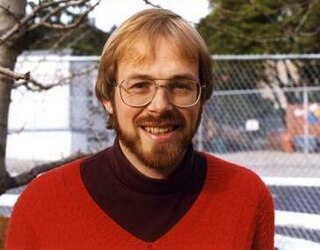
Richard Lawrence Taylor is a British mathematician working in the field of number theory. He is currently the Barbara Kimball Browning Professor in Humanities and Sciences at Stanford University.
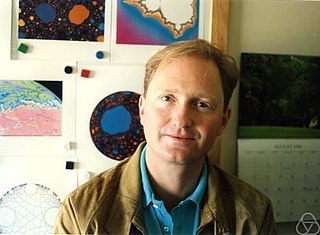
Curtis Tracy McMullen is an American mathematician who is the Cabot Professor of Mathematics at Harvard University. He was awarded the Fields Medal in 1998 for his work in complex dynamics, hyperbolic geometry and Teichmüller theory.

Jean, Baron Bourgain was a Belgian mathematician. He was awarded the Fields Medal in 1994 in recognition of his work on several core topics of mathematical analysis such as the geometry of Banach spaces, harmonic analysis, ergodic theory and nonlinear partial differential equations from mathematical physics.
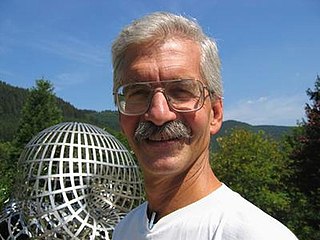
Nicholas Michael Katz is an American mathematician, working in arithmetic geometry, particularly on p-adic methods, monodromy and moduli problems, and number theory. He is currently a professor of Mathematics at Princeton University and an editor of the journal Annals of Mathematics.

Manjul Bhargava is a Canadian-American mathematician. He is the Brandon Fradd, Class of 1983, Professor of Mathematics at Princeton University, the Stieltjes Professor of Number Theory at Leiden University, and also holds Adjunct Professorships at the Tata Institute of Fundamental Research, the Indian Institute of Technology Bombay, and the University of Hyderabad. He is known primarily for his contributions to number theory.
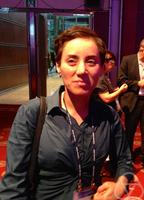
Maryam Mirzakhani was an Iranian mathematician and a professor of mathematics at Stanford University. Her research topics included Teichmüller theory, hyperbolic geometry, ergodic theory, and symplectic geometry. In 2005, as a result of her research, she was honored in Popular Science's fourth annual "Brilliant 10" in which she was acknowledged as one of the top 10 young minds who have pushed their fields in innovative directions.
The mathematician Shmuel Aaron Weinberger is an American topologist. He completed a PhD in mathematics in 1982 at New York University under the direction of Sylvain Cappell. Weinberger was, from 1994 to 1996, the Thomas A. Scott Professor of Mathematics at the University of Pennsylvania, and he is currently the Andrew MacLeish Professor of Mathematics and chair of the Mathematics department at the University of Chicago.
Daniel Alan Spielman has been a professor of applied mathematics and computer science at Yale University since 2006. As of 2018, he is the Sterling Professor of Computer Science at Yale. He is also the Co-Director of the Yale Institute for Network Science, since its founding, and chair of the newly established Department of Statistics and Data Science.

Tomasz Mrowka is an American mathematician specializing in differential geometry and gauge theory. He is the Singer Professor of Mathematics and former head of the Department of Mathematics at the Massachusetts Institute of Technology.
The Maryam Mirzakhani Prize in Mathematics is awarded by the U.S. National Academy of Sciences "for excellence of research in the mathematical sciences published within the past ten years." Named after the Iranian mathematician Maryam Mirzakhani, the prize has been awarded every four years since 1988.
Lawrence David Guth is a professor of mathematics at the Massachusetts Institute of Technology.
Amie Wilkinson is an American mathematician and Professor of Mathematics at the University of Chicago. Her research topics include smooth dynamical systems, ergodic theory, chaos theory and semisimple Lie groups. Wilkinson, in collaboration with Christian Bonatti and Sylvain Crovisier, partially resolved the twelfth problem on Stephen Smale's list of mathematical problems for the 21st Century.
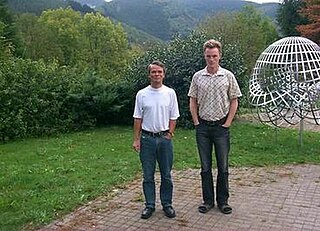
Søren Galatius is a Danish mathematician who works as a professor of mathematics at the University of Copenhagen. He works in algebraic topology, where one of his most important results concerns the homology of the automorphisms of free groups. He is also known for his joint work with Oscar Randal-Williams on moduli spaces of manifolds, comprising several papers.

Manfred Leopold Einsiedler is an Austrian mathematician.
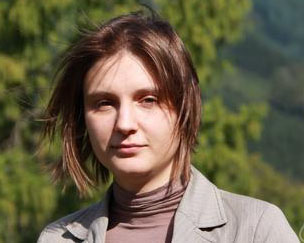
Maryna Sergiivna Viazovska is a Ukrainian mathematician known for her work in sphere packing. She is full professor and Chair of Number Theory at the Institute of Mathematics of the École Polytechnique Fédérale de Lausanne in Switzerland. She was awarded the Fields Medal in 2022.
Eleny-Nicoleta Ionel is a Romanian mathematician whose research concerns symplectic geometry, including the study of the Gromov–Witten invariants and Gopakumar–Vafa invariant. Among her most significant results are the construction of relative Gromov-Witten invariants of symplectic manifolds, and the proof of the vanishing in codimension at least g of the tautological ring of the moduli space of genus-g curves.
Mihnea Popa is a Romanian-American mathematician at Harvard University, specializing in algebraic geometry. He is known for his work on complex birational geometry, Hodge theory, abelian varieties, and vector bundles.
Shahar Mozes is an Israeli mathematician.
Lisa Marie Piccirillo is an American mathematician who works on geometry and low-dimensional topology. In 2020, Piccirillo published a mathematical proof in the journal Annals of Mathematics determining that the Conway knot is not a slice knot, answering an unsolved problem in knot theory first proposed over fifty years prior by English mathematician John Horton Conway. In July 2020, she became an assistant professor of mathematics at Massachusetts Institute of Technology.
Tsachik Gelander is an Israeli mathematician working in the fields of Lie groups, topological groups, symmetric spaces, lattices and discrete subgroups. He is a professor in Northwestern University.











